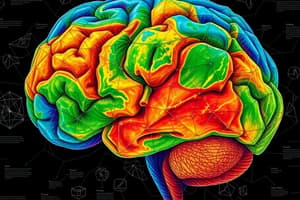Podcast
Questions and Answers
What is a concept and how does it help in categorizing objects or events?
What is a concept and how does it help in categorizing objects or events?
A concept is a way of grouping or categorizing objects or events in our mind, which helps us understand and organize our experiences.
What distinguishes a defining feature from a correlational feature?
What distinguishes a defining feature from a correlational feature?
A defining feature is present in all instances of a concept, while a correlational feature is commonly seen but not essential for concept membership.
How does the prototype theory relate to the formation of concepts?
How does the prototype theory relate to the formation of concepts?
Prototype theory involves creating a typical image or idea of a concept based on frequently encountered examples, helping to categorize new instances.
Can you give an example of a concrete concept and its tangible characteristics?
Can you give an example of a concrete concept and its tangible characteristics?
What role do exemplars play in concept learning?
What role do exemplars play in concept learning?
What is a defining characteristic of a politician?
What is a defining characteristic of a politician?
How do abstract concepts differ from concrete concepts?
How do abstract concepts differ from concrete concepts?
What is a schema?
What is a schema?
What role do scripts play in learning?
What role do scripts play in learning?
What is one effective strategy for teaching concept formation?
What is one effective strategy for teaching concept formation?
Flashcards are hidden until you start studying
Study Notes
Understanding Concepts
- Concepts categorize objects or events, helping in the cognitive organization of knowledge.
- "Teach" as a concept encompasses tasks like modeling, discussing, illustrating, explaining, and assisting.
- Students learn many concepts, ranging from simple to complex, often requiring gradual understanding and revision.
Features of Concepts
- Learning a concept necessitates grasping defining features (required for membership) and correlational features (commonly associated but not essential).
- Defining Features: Must be present in all instances; e.g., a triangle must have three sides.
- Correlational Features: Commonly observed but not universal; e.g., a mother being loving, but not all mothers fit this trait.
Prototypes and Exemplars
- Prototypes: Mental images of typical examples formed from frequent positive instances; e.g., a common cat breed image rather than a rare variant.
- Exemplars: Diverse examples showing variability within a concept; e.g., the concept of vegetable encompasses many items like cauliflower and corn.
Types of Concepts
- Concrete Concepts: Easily identifiable through sensory experience; e.g., fruits are seed-related and fleshy.
- Semi-concrete Concepts: Blends concrete and abstract traits; e.g., a politician has identifiable characteristics but also less tangible roles.
- Abstract Concepts: Lack visible characteristics; understood through personal beliefs and mental imagery; e.g., love is perceived differently by individuals.
Effective Concept Learning Strategies
- Provide clear concept definitions and highlight defining features.
- Use a variety of positive and negative examples to illustrate concepts.
- Cite a best example or prototype for clarity.
- Encourage learners to identify positive and negative instances.
- Facilitate student-generated examples and relate concepts to one another.
Schemas and Scripts
- Schemas: Organized knowledge about a topic, acting as a mental file; e.g., schema about what constitutes a teacher.
- Scripts: Schemas detailing predictable events in activities; e.g., the steps taken during a doctor's visit or classroom routines.
Role of Teachers in Concept Development
- Facilitate the construction of well-organized knowledge to clarify vague concepts and rectify misconceptions.
- Develop skills to promote concept formation and development among learners.
Applying Constructivism in Teaching
- Focus on in-depth understanding of a few key ideas rather than superficial coverage of many topics.
- Offer varied examples and encourage experimentation through hands-on activities.
- Promote quality interaction and relate lessons to real-life situations to enhance engagement and understanding.
Studying That Suits You
Use AI to generate personalized quizzes and flashcards to suit your learning preferences.




